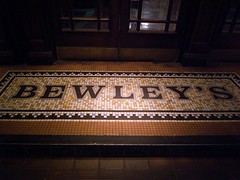FOWA Dublin roundup.
Last Friday was the Future of Web Apps Dublin 2009. It was a packed day, with the venue as crowded as the schedule. There were ten sessions, plus the ‘uni’ workshops during the breaks.
By the time I got home on the Friday night I was knackered, and I was nursing my usual post-conference headache. I came away with a lot to think about: even though the content was aimed squarely at a particular field of endeavour, and there was a very strong emphasis on making money (fair enough — food and lodging are nice to have :), much of what was said was very (surprisingly?) transferable to just about anywhere, including the volunteer/support/community work/youth work/faith spheres. That’s value for money!
This won’t be for every reader here, so click on through if you want my brief (some briefer than others) thoughts on some of the different sessions (there were others).<h3>Eoghan McCabe and Des Traynor, Unconventional web apps.</h3>
The Contrast lads did a good job after they got over the initial nerves. (For the first wee bit Des looked a little uncomfortable and Eoghan occasionally talked too fast for me to catch everything he said!)
Their gist was an admonishment to think carefully about the way you build something, and whether you make certain decisions because that’s the way it’s done or because it’s the right way to do it. Solid advice, but it’s worth remembering the first part of their presentation where they point out that conventions generally exist for a reason: Amazon.com uses a standard three-column layout and “they don’t do it for the craic!”
Their most useful observation, I think, was that the web is built on technologies that were never intended to enable the kind of rich applications they’re being shoe-horned into, so where can we examine and drop the page-based paradigm that those technologies tempt us to default to?
It was all good advice whatever you’re trying to accomplish: reflect on how convention (call it tradition, even) can interfere with effective practice.
I wasn’t at all taken with the examples of zooming site navigation (e.g. Zoomism), and I wonder how this whole thing interacts with the next session.
(By the way, the Contrast website is a nice example of doing things just a little bit differently, to super effect.)
Robin Christopherson, Apps for all in a Web 2.0 world.
Robin’s session was very different to any of the others. He works for AbilityNET and describes himself as having no useful vision, and the presentation was more of a demonstration of what it’s like to use the modern web via assistive technologies.
Alongside the more prominent points Robin made (CAPTCHAs — even “accessible” ones — exclude plenty of people, be prepared for the user accessing your content in different ways, look into all the options available to increase accessibility, the various technical details that can help or hinder), the best part of this session was seeing and hearing someone using only a screenreader and keyboard to use real sites in real ways.
I’ve been interested in web accessibility for a few years now, although I don’t always get it right, but nothing drives it home more than seeing the real-world effects. It’s similar to how when I was working in care and had to take a client to a shop in her wheelchair, I noticed something I had never spotted before — the counter where she had to pay was just above her head height, which made it difficult to deal with the teller in any sort of dignified way. Extrapolate from there, and ponder the implications for absolutely everything you do.
Emma Persky, The future is Ruby without Rails.
Emma got a rough ride. By way of making the point (in an enjoyable but very roundabout way) that you should always use the best tool for the job, she made the mistake of suggesting that Rails might not be the best way to approach every problem.
Cue fanboy ire from the audience, including a question that began, “I see what you’re saying, but given that Rails is the best way to approach 95% of problems…” Heh.
Morgan McKeagney, Yet another web app? Or a successful business?
“… or are you just playing guitar in your bedroom?” Well put. But I do enjoy sitting on my bed playing guitar :)
Matthew Ogle, How to build a desktop app that helps your web app succeed.
This was a fascinating tour of Last.fm and their approach to gathering data. (To see a little of what they do, you can check out my Last.fm page.) Matt also quietly plugged Last.fm’s new tech, Boffin, which does interesting things with your music library.
Simon Willison, Web app security horror stories.
I’m glad I’m able to say that there was nothing here I hadn’t heard of, but this session still provided some heebie-jeebies.
David Heinemeier Hansson, Doing a start up in the real world.
DHH gave the presentation that I think most attendees will have found most memorable. He’s a guy who talks with complete confidence — to the point where I found it quite off-putting. Once I got past his presentation style, he did talk good, and inspirational, sense. His advice boiled down to, “If you want to do something, do it; don’t be put off by nay-sayers; don’t expect someone else to do it for you; and ‘start up’, like the ‘real world’, is a nonsense — build a business.”
Of course, given that all this web app and businessy stuff is more of a sideline for me (early mornings and late nights), I did feel a little bit of an impostor at FOWA. Even so, it was all well worth the ticket and the early morning train ride, and I’ve got plenty to think about — and maybe an idea or two to code up.

